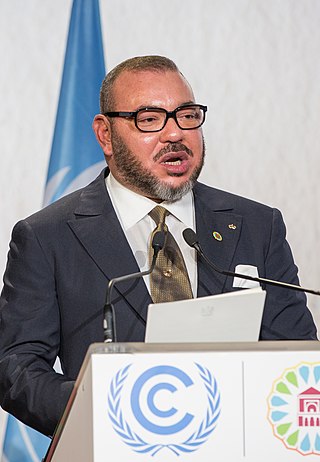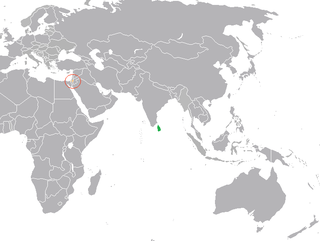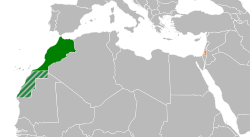
Mohammed VI is King of Morocco. A member of the 'Alawi dynasty, he acceded to the throne on 23 July 1999, upon the death of his father, King Hassan II.

Maghreb Arabe Presse (MAP), also known as Maghreb Agence Presse, is the government-owned official news agency of the Kingdom of Morocco.

Pakistan–Palestine relations refer to the bilateral relations between Islamic Republic of Pakistan and State of Palestine. The Palestinian Authority established an embassy in Islamabad on 31 January 2017. Pakistan remains a staunch supporter of the proposal for the creation of an independent Palestinian state, and in line with its pro-Palestinian doctrine, does not recognize the State of Israel. However, the former President of Pakistan, Pervez Musharraf, stated that Pakistan will recognize Israel's sovereignty if the latter withdraws its forces from the Israeli-occupied territories and allows an independent Palestinian state to be established within the Green Line that served as the international border between Israel and the Palestinian territories from the First Arab–Israeli War of 1948 to the Third Arab–Israeli War of 1967. Pakistan frequently provides various forms of humanitarian aid to the Palestinian Authority.

The bilateral relations between the State of Palestine and Russia have a complex history, deeply interwoven with Russian and Soviet relations with the Israeli enterprise, Palestinian nationalism, and Third World national liberation movements. Between 1956 and 1990, Soviet-Palestinian relations were part of the then ongoing Soviet-American confrontation.

The Palestine lobby in the United States is organized by a number of pro-Palestinian advocacy groups seeking to influence the United States government, institutions, and citizens to actively oppose Israel's occupation of the Palestinian territories, many of them members or cooperating with the U.S. Campaign for Palestinian Rights. These organizations include peace and anti-war, human rights, anti-Zionist, and Arab- and Muslim-American groups. Groups against occupation also include Jewish Voices for Peace and Students for Justice in Palestine, among others. Their tactics include education, protest, civil disobedience and lobbying.

Egypt–Palestine relations are the bilateral relations between the Arab Republic of Egypt and the State of Palestine. Egyptian President Gamal Abdel Nasser was a strong supporter of the Palestinian cause and he favored self-determination for the Palestinians. Although the Egyptian government has maintained a good relationship with Israel since the Camp David Accords, most Egyptians strongly resent Israel, and disapprove of the close relationship between the Israeli and Egyptian governments.

Relations between the Arab Republic of Iraq and State of Palestine have historically been close, with Palestinian Liberation Organization supported by the Ba'athist Iraqi regime during the second half of the 20th century, and vice versa, Iraqi Ba'athist regime supported by PLO leadership during the Gulf War. The State of Palestine has an embassy and consulate in Baghdad and Erbil accordingly, but Iraq doesn't have an embassy in Palestine.

Relations between Indonesia and Palestine have been very close and friendly. Indonesia has refused to recognize the State of Israel until a peace agreement is reached between Israel and the State of Palestine. Indonesia has strongly stood up for the rights and freedoms of the Palestinians and has supported the struggles of the Palestinians.

The alliance between Algeria and Palestine is strong and enduring. Algeria is a supporter of the Middle East peace process and it has no diplomatic relations with Israel.

The State of Israel and the Kingdom of Morocco formally established diplomatic relations in 2020, when both sides signed the Israel–Morocco normalization agreement in light of the Abraham Accords. While official ties had previously not existed due to the Arab–Israeli conflict, the two countries maintained a secretive bilateral relationship on a number of fronts following the 1948 Arab–Israeli War. For many years, Moroccan king Hassan II facilitated a relationship with Israeli authorities, and these ties are considered to have been instrumental in stabilizing Morocco and striking down possible anti-monarchy threats within the country. The Israeli passport is accepted for entry into Morocco, with a visa granted on arrival. With the bilateral normalization agreement in December 2020, Morocco officially recognized Israeli statehood. Almost three years later, in July 2023, Israel officially recognized Moroccan sovereignty over Western Sahara.

Reactions to the 2014 Gaza War came from around the world.

The keffiyeh or kufiyyeh, also known in Arabic as a ghutrah (غُترَة), shemagh, or ḥaṭṭah (حَطَّة), is a traditional headdress worn by men from parts of the Middle East. It is fashioned from a square scarf, and is usually made of cotton. The keffiyeh is commonly found in arid regions, as it provides protection from sunburn, dust and sand. An agal is often used by Arabs to keep it in place.
Throne Day is a national occasion in Morocco currently celebrated on 30 July of each year, punctuated by several official and popular celebrations, commemorating the day of the King's accession to the throne. The first celebration was held in 1933 to recognise the accession of Mohammed V of Morocco in 1927. The current King Mohammed VI succeeded his father on 23 July 1999 and officially took the throne on 30 July. On the occasion, several nationwide events are covered on public television, including official activities.

Nasser Bourita is a Moroccan diplomat serving as the Minister of Foreign Affairs, African Cooperation and Moroccan Expatriates since 5 April 2017.

Morocco–Saudi Arabia relations refers to the current and historical relations between the Kingdom of Morocco and Kingdom of Saudi Arabia. Morocco has an embassy in Riyadh and Saudi Arabia has an embassy in Rabat.

Palestine–Sri Lanka relations refer to the bilateral relations between the State of Palestine and Sri Lanka. Historically, relations between the two countries have been very friendly. Relations between Palestine and Sri Lanka started in 1975, when the Palestine Liberation Organization (PLO) opened up an embassy in Colombo. After the Palestinian Declaration of Independence on 15 November 1988, Sri Lanka and the Maldives were among the first few countries in the world to recognize the State of Palestine.

Official relations between the two countries of Palestine and the Sahrawi Arab Democratic Republic do not exist, being as neither country is fully recognised internationally. Despite this, there are informal connections.
On 7 October 2023, a large escalation of the Gaza–Israel conflict began with a coordinated offensive by multiple Palestinian militant groups against Israel. A number of countries, including many of Israel's Western allies, such as the United States and a number of European countries, condemned the attacks by Hamas, expressed solidarity for Israel and stated that Israel has a right to defend itself from armed attacks, while countries of the Muslim world have expressed support for the Palestinians, blaming the Israeli occupation of the Palestinian territories as being the root cause for the escalation of violence. The events prompted several world leaders to announce their intention to visit Israel, including US President Joe Biden, French President Emmanuel Macron, German Chancellor Olaf Scholz, and British Prime Minister Rishi Sunak.

The Israel–Hamas war sparked protests, demonstrations, and vigils around the world. These events focused on a variety of issues related to the conflict, including demands for a ceasefire, an end to the Israeli blockade and occupation, returning Israeli hostages, protesting war crimes, and providing humanitarian aid to Gaza. Protests against Israeli action in Gaza were notably large across the Middle East and North Africa, particularly following the al-Ahli Arab Hospital explosion. Since the war began on 7 October, the number of dead has exceeded 20,000.
The Israel–Hamas war sparked a major diplomatic crisis, with many countries around the world reacting strongly to the conflict that affected the momentum of regional relations. At least nine countries took the drastic step of recalling their ambassadors and cutting diplomatic ties with Israel. The conflict has also resulted in a renewed focus on a two-state solution to the ongoing conflict.



















